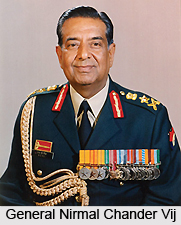 General Nirmal Chander Vij was born January on 1943 in Jammu.He was the 21st Indian Chief of Army Staff Preceded by Sundararajan Padmanabhan .He assumed the office of Indian Chief of Army Staff on 31 Dec 2002.His received his early education from SRML Higher Secondary School in Jammu and than joined the National Defence Academy at pune in 1959.He was commissioned into the Dogra Regiment on 11th December 1962.
General Nirmal Chander Vij was born January on 1943 in Jammu.He was the 21st Indian Chief of Army Staff Preceded by Sundararajan Padmanabhan .He assumed the office of Indian Chief of Army Staff on 31 Dec 2002.His received his early education from SRML Higher Secondary School in Jammu and than joined the National Defence Academy at pune in 1959.He was commissioned into the Dogra Regiment on 11th December 1962.
After few weeks of his joining in the Indian Army, he saw Indo-China War in Walong sector in 1962 .He served in the eastern region six times.It is a record in the Indian Army. He was the General Officer Commanding of the 4 Corps while he was serving last time in the eastern sector. IN 1971 Indo-Pak war, his troops was the first one to capture the `Chicken Neck` and also occupied the `Chhote Chak` post of Pakistan in Miran Sahib Sector. During his long tenure in the Indian Army,he served as the General Staff Officer of an Infantry Division, a Director in the Military Operations Directorate as a Colonel and Deputy Director General of Perspective Planning (Strategic Planning) as a Brigadier at Army HQ in New Delhi.
General Vij was the Major General General at the Western Command at Chandimandir in Chandigarh .In 1999 during Kargil war against Pakistan, he served as the Director General Military Operations.He was decorated with Uttam Yudh Seva Medal for outstanding performances as DGMO in the Kargil war. General Nirmal Chander Vij got several professional acclaim for successfully carrying out the Operation Khukri He also accomplished a great job for the trapped Indian peacekeeping troops in Sierra Leoneafter successfully commanded a mountain brigade involved in active counter-insurgency operations in the north east, an elite RAPID (Reorganised Army Plains Infantry Division) unit, the 1 Strike Corps based at Bhopal, Madhya Pradesh and the IV Corps based at Tezpur, Assam. General Nirmal Chander Vij was conferred with Param Vishisht Seva Medal for his extraordinary performances as a army staff. General Vij served also as a commander in some major fronts including a Strike Corps and a Corps positioned in active counter-insurgency operations in the North East on 01 October 2000.After that he was posted to Southern Command as the GOC at pune.In 2001 at the time of Gujarat earthquake he was the leader of the Indian Army`s rescue team. General Nirmal Chander Vij was selected for the post of Vice Chief of Army Staff (VCOAS) at New Delhi and in January 2002. He was appointed as the 10th Colonel of the Dogra Regiment and the Dogra Scouts in the same year. While he was the Chief of Army Staff, the Royal Bhutan Army and the Indian Army undertook a joint operation and force to leave the United liberation Front of Assam (ULFA) from their base camps in Bhutan in December 2003. In 2004 General Nirmal Chander Vij was nominated as the Chairman Chiefs of Staff Committee (COSC).After completing 42 years of distinguished military service he retired as the Indian Chief of Army Staff on 31 January 2005.He was succeeded by Joginder Jaswant Singh.He was the honorary Colonel of the Dogra Regiment & Dogra Scouts and also Deputy Chairman of National Disaster Management Authority, Govt of India. He was also closely associated with the Married Accommodation Project (MAP), establishment of Professional Colleges and Ex-Servicemen`s Health Scheme (ECHS). General Nirmal Chander Vij is married to Mrs. Rita Vij and they have a son, Nalin, who is a software engineer in the United States.




















